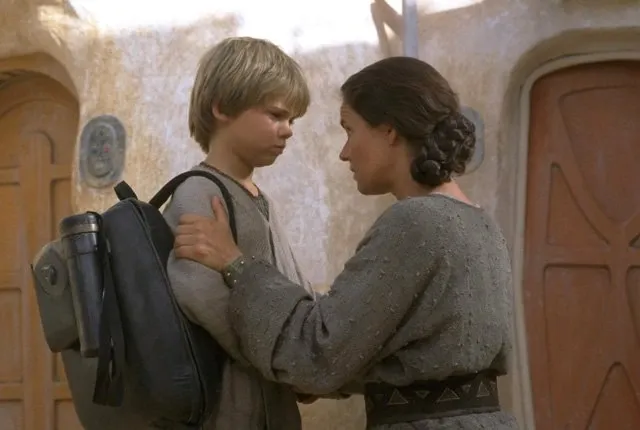Shmi's life is a series of unfortunate events, each more devastating than the last. Abducted and enslaved, she finds herself in the harsh desert world of Tatooine. In this bleak and unforgiving environment, her son Anakin becomes her beacon of hope, a miraculous gift from the Force. He is not just her child; he is her emotional anchor in a life otherwise devoid of comfort.
When Anakin wins the Boonta Eve Classic Podrace, a door to a new life opens for him. Shmi is then faced with an agonizing choice. She can either cling to her son, her only source of joy, or she can let him go, giving him the opportunity for a life of freedom and purpose. With immense courage and emotional intelligence, Shmi chooses to detach herself from Anakin. She understands that her attachment, however loving, could become a shackle that limits his potential.
It's important to delve deeper into the emotional complexity of Shmi's decision. She is not merely "letting go" in a passive sense; she is actively sacrificing her own happiness for Anakin's future. This is a form of detachment that is deeply rooted in love and selflessness. It's a nuanced understanding of the concept, one that transcends mere doctrine and touches on the essence of unconditional love.
Anakin, despite his Jedi training, finds the concept of detachment to be a constant struggle. His attachments form the crux of his emotional life and, ultimately, his downfall. Whether it's his deep-seated fears about losing his mother, his romantic attachment to Padmé Amidala, or his desire for power and recognition, Anakin is a slave to his emotions in a way that his mother never was.
One of the most pivotal moments that highlight the contrasting approaches to attachment between Shmi and Anakin occurs when Anakin finds his dying mother in the arms of Tusken Raiders. Shmi's final moments are spent in the arms of her son, and her death becomes the catalyst for one of Anakin's darkest deeds—the massacre of the Tusken Raider village.
This event is a manifestation of Anakin's failure to understand or practice the detachment his mother so courageously demonstrated. Consumed by rage and grief, he annihilates the village, including women and children. This act is not just a personal failure; it's a failure of the Jedi philosophy to equip him with the emotional tools necessary to cope with such devastating loss.
And it pushes him one step closer to the dark side of the Force.
The Jedi Code, with its emphasis on non-attachment, seems woefully inadequate in preparing Anakin for the emotional complexities of life. While the Code advises against forming attachments, it offers little guidance on how to navigate the emotional landscape when those attachments are inevitably formed. Shmi, who had no Jedi training, seems to have a more intuitive and humane understanding of what true detachment means.
Shmi's ability to detach herself from Anakin, born out of unconditional love and a deep understanding of the bigger picture, stands in stark contrast to the Jedi Order's more doctrinal approach. Her actions serve as a critique of the Jedi philosophy, exposing its limitations and its failure to address the emotional complexities that come with attachment. Shmi's form of detachment is not about emotional withdrawal but about loving someone enough to let them find their own path, even if it leads away from you.
The characters of Shmi and Anakin Skywalker offer a rich, layered exploration of the concept of attachment in the Star Wars saga. Shmi's life, filled with hardship and sacrifice, exemplifies a form of detachment that is both loving and liberating. Anakin's journey, on the other hand, serves as a cautionary tale about the dangers of attachment when not tempered by wisdom and emotional maturity. The contrasting paths of mother and son provide a nuanced critique of the Jedi Order's philosophy, revealing the complexities and limitations of a doctrine that could not save its most promising pupil from his darkest impulses.
















